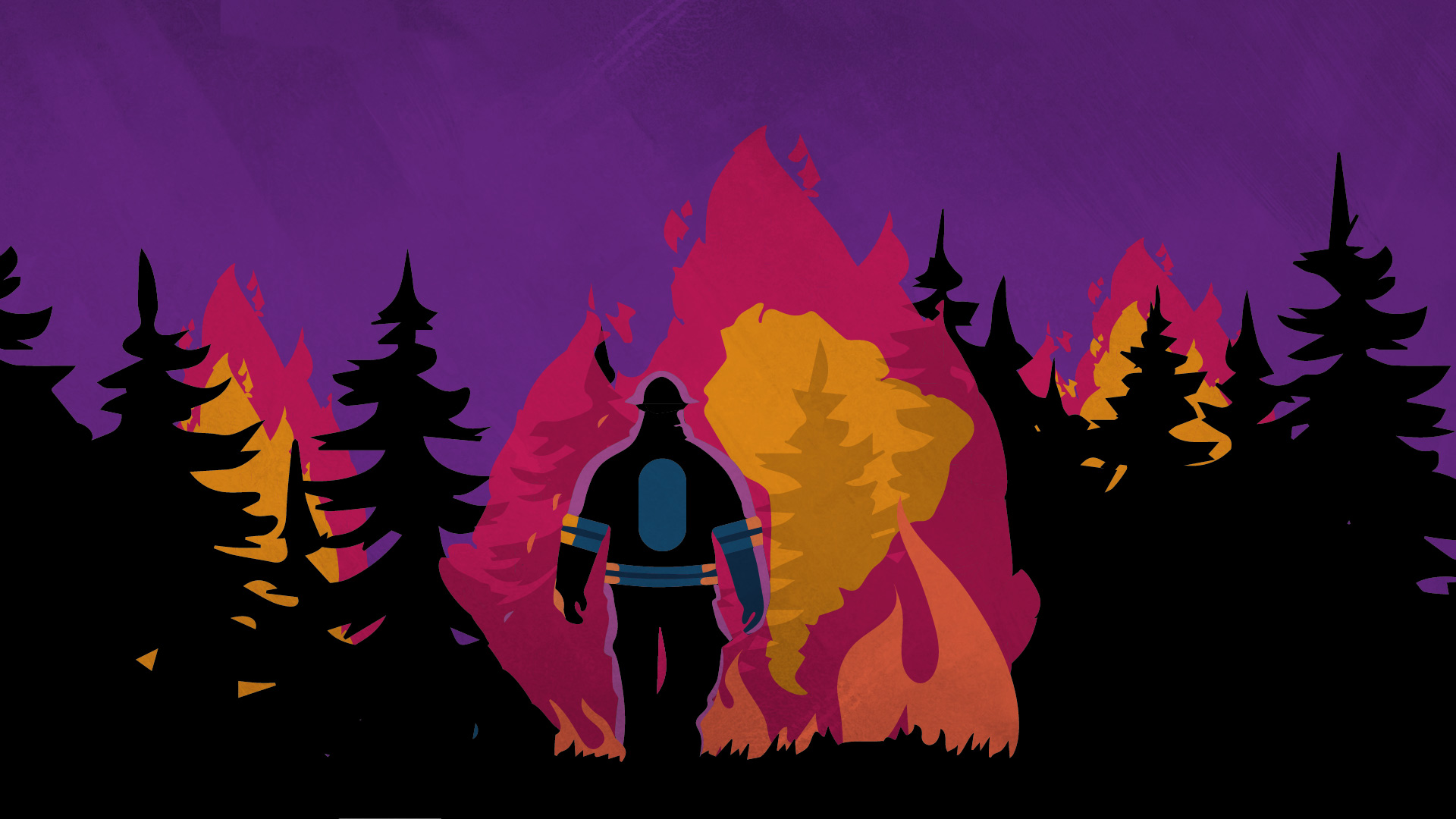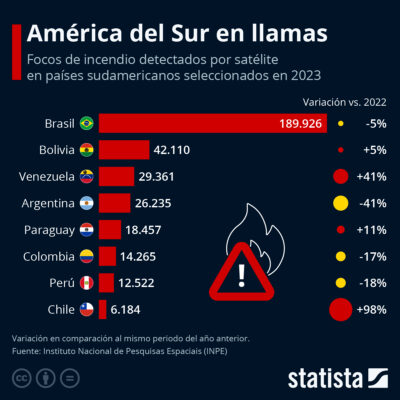
Illustration by CONNECTAS. Used with permission.
This article was written by Grisha Vera and published in CONNECTAS on February 13, 2024. An edited version is republished on Global Voices under a media agreement.
“There is nothing that is really a ‘natural’ disaster. The disaster is what happens because society allows it to happen…” said American journalist June Carolyn Erlick in her book “Natural Disasters in Latin America.”
Los recientes incendios en Valparaíso, zona centro-sur de Chile, mataron a 132 personas y dejaron a miles de familias sin sus casas. Varias autoridades, incluido el presidente Gabriel Boric, denunciaron que los incendios fueron provocados: “Que sepan, cualquiera que se encuentre prendiendo un foco y desatando la tragedia que hemos visto, los vamos a buscar por todas partes y les va a caer todo el peso de la ley, además del repudio de toda una sociedad entera, porque lo que han causado es inconmensurable”, dijo Boric desde Viña del Mar luego del desastre.
The recent wildfires in Valparaíso in south-central Chile killed 132 people and left thousands of families without their homes. Several authorities, including President Gabriel Boric, claimed that the fires were arson: “Let them know, anyone who finds themselves turning on a light and unleashing the tragedy that we have seen, we are going to look for them everywhere and the full weight of the law will fall on them, in addition to the repudiation of an entire society, because what they have caused is immeasurable,” Boric said from Viña del Mar after the disaster.
There were arrests for the Valparaíso fires, but the Prosecutor's Office did not accuse them because they found no evidence. There were complaints from citizens about alleged new arsonists, but the Police did not find them. There was also misinformation, such as that seven Venezuelans were lighting new lights in another area. But, although that version went viral, it was not true.
Chile, like at least eight other countries in South America, suffers thousands of forest fires every year and must prepare to prevent and respond to these events that will occur with increasing frequency and magnitude due to climate change. In October 2023, for example, in two of the most important towns in Bolivia, La Paz and Santa Cruz, poor air quality caused by forest fires forced the government to suspend school classes.

Infographic made by Stastia. Used with permission.
These natural events, increasingly expected, show the failures of institutions and societies. A few weeks before the Valparaíso tragedy, the fires also affected Bogotá, the Colombian capital, and other parts of that country. The emergency made public the budget reduction for the fire department, and a councilor from Bogotá reported that the resources of other key institutions to prevent and confront natural disasters were also reduced, just at a time when humanity expects more and strongest events of this type. In the midst of the crisis, Colombia's national fire director was also fired, supposedly for denouncing this lack of resources.
Argentine Patagonia has also been burning since the beginning of the year. According to a report by Amnesty International, more than half a million hectares burned in that country in 2022 alone. “It is essential that the Argentine state advances in compliance with its international commitments regarding the protection of the environment and human rights,” the document concludes.
Preventing fires
Most fires in Chile are related to human action. Many times there may even be intentionality, but it is not just that.
Ariel Muñoz, doctor in forestry sciences and professor at the Pontifical University of Valparaíso, explains that the country's forestry policies, which respond to economic reasons, also have a lot to do with it. First because they have created more flammable landscapes and second because some people start fires to generate changes in land use.
Dr. Eduardo Peña, an expert in fire ecology, comments that all vegetation can burn, even native forests, as is currently happening in Argentina. He explains that, for a fire to occur, three elements must come together: fuel (dry vegetation), oxygen and a heat source, in most cases due to human action. That is, when the temperature is greater than 30 degrees Celsius, the relative humidity of the environment is less than 30 percent and the wind speed is greater than 30 kilometers per hour. Experts warn that these conditions occur more every day due to climate change.
Peña points out firewalls as a fundamental part of prevention measures. And he gives an example:
En el año 2009 en Australia ocurrió un gran incendio, que causó la muerte de 174 personas. En ese momento ese país reflexionó que habiendo combustible los incendios no se pueden detener. Entonces establecieron una ley donde es obligatorio hacer cortafuegos en las propiedades.
In 2009 in Australia a large fire occurred, which caused the death of 174 people. At that moment that country reflected that if there is fuel, the fires cannot be stopped. So they established a law where it is mandatory to make firebreaks on properties.
The ecologist adds that the maintenance of houses and cities also reduces the impact and spread of fire. “A village in Valparaíso, called Botania, did not burn and the reason was that it was clean around it.” He says that, for experts, firebreaks are not enough if cities and houses are not cleared of dry vegetation.
Los árboles de Hiroshima, símbolo de duelo y esperanza tras los trágicos incendios en Chile
El fuego que castigó durante días la Región de Valparaíso logró ser extinguido. Los incendios más mortíferos que recuerde #Chile se cobraron la vida de 131 personas y destruyeron… pic.twitter.com/FkmCJpMzKN
— DW Español (@dw_espanol) February 8, 2024
The trees of Hiroshima, a symbol of mourning and hope after the tragic fires in Chile
The fire that punished the Valparaíso Region for days managed to be extinguished. The deadliest fires in #Chile memory claimed the lives of 131 people and destroyed…
Other interviewed xperts agree that unplanned urban expansion is another risk factor.
En muchos países ocurre que la ciudad empieza a expandirse, pero con un sistema no planificado en cuanto al lugar y el tipo de material, diseño y recursos que escasamente tienen. Entonces, en el caso de Valparaíso muchos eran terrenos ocupados y las construcciones eran principalmente en madera y a veces incluso en cartones. Por lo tanto, una vez que se inicia el fuego es prácticamente imposible detenerlo. Entonces vimos imágenes de cuando las personas iban saliendo en vehículo y quedaron trabadas.
In many countries it happens that the city begins to expand, but with an unplanned system in terms of location and the type of material, design and resources that they barely have. So, in the case of Valparaíso, many were occupied lands and the buildings were mainly made of wood and sometimes even cardboard. Therefore, once a fire starts it is practically impossible to stop it. Then we saw images of when people were leaving in vehicles and got stuck.
Both experts also point out that education is essential to reduce the likelihood of fires and reduce their impact.
